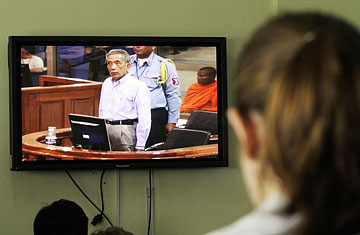
Journalists watch senior Khmer Rouge regime member Kaing Guek Eav, also known as Duch, on a live feed during the court session announcing the verdict of his trial at the Extraordinary Chambers in the Courts of Cambodia on the outskirts of Phnom Penh on July 26, 2010
Cambodians hoping for a punishment to match their suffering expected more. In its first verdict, the U.N.-backed tribunal established in 2006 to try the leaders and decisionmakers of the Pol Pot regime convicted the regime's secret police chief of war crimes and crimes against humanity, sentencing him on Monday, July 26, to 35 years in prison for the murders of as many as 14,000 people.
But in an irony few victims will appreciate, the court allowed the accused, Kaing Guek Eav, 67, who is best known by his revolutionary name Duch, a five-year sentence reduction for violations of his human rights, owing to his eight-year pretrial detention by Cambodian authorities. In addition, Duch — a Christian convert who during his nine-month trial admitted ordering the executions of 160 children in a single day in June 1977 — was credited for the 11 years he has served since his arrest in 1999. Only 19 years of his sentence remain, and if Cambodian law is applied, he could, in theory, be eligible for parole in just 12 years.
The 500-seat public gallery, the largest of any courtroom in the world, was filled to capacity. There was uncomprehending silence as Judge Nil Nonn, the trial chamber's president, read the judgment and the arithmetic of the sentence's reductions.
Later, outside the courthouse, Chum Mey, 79, one of the handful who survived internment at S-21 but who lost his family to the regime, said he was outraged. "I will never accept such a decision," he said. "I am not happy with this court. My tears have dropped twice already because it's not what I wished."
War-crimes tribunals are known for punishing mass atrocities with sentences that resemble those given to criminals in ordinary courts. For his role in the 1995 Srebrenica massacres, Bosnian Serb Major General Radislav Krstic was sentenced by a Yugoslavia tribunal to 35 years; as he'd killed 7,000 to 8,000 men and boys, the lead prosecutor calculated that this amounted to 1.825 days in prison per victim.
In Duch's case, the prosecution in November had recommended 40 years; following the verdict, it said it was considering an appeal. "It certainly provides a penalty that the Cambodian public will appreciate, in the fact that it's a custodial sentence," says William Smith, international deputy co-prosecutor, who notes that the defense had improbably asked for an acquittal at the very end of the trial. "We'll be reviewing the judgment, reviewing the findings of fact and seeing whether or not there have been any errors made."
In the service of the Khmer Rouge leadership, Duch committed crimes that became emblematic of the atrocities of his regime, though they were only one part of the wave of criminality that convulsed Cambodia in 1975 and that prosecutors say left 1.7 million to 2.2 million dead through starvation, overwork, disease and execution.
Pol Pot and the leaders of the communist insurgency that seized Phnom Penh in 1975 put Duch in the service of their implacable, paranoid belief that secret enemies were hiding everywhere. Duch, a former schoolteacher turned chief of Cambodia's secret police, known by the codename S-21, became a killing machine, sacrificing men, women and children to his superiors' foregone conclusions. Under torture, thousands were forced to invent fantastic confessions of treachery for the CIA, the KGB or Vietnamese agents, though interrogators knew they were false.
